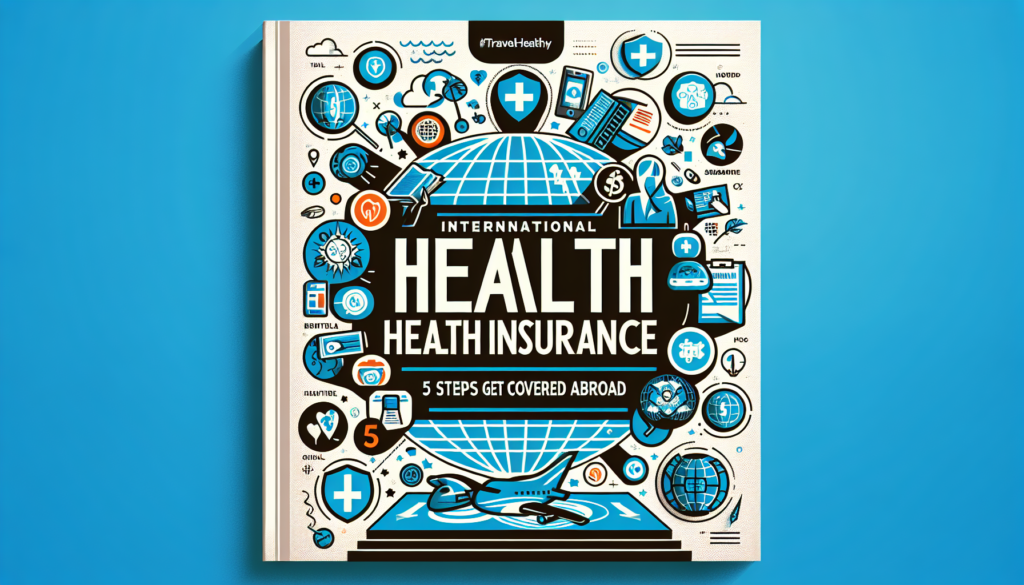Discover the keys to choosing your international health insurance and acting effectively in the event of a dispute with your insurer. Tips and tricks to ensure your peace of mind when traveling internationally.
Understanding the guarantees offered by international health insurance
Types of guarantees offered by international health insurance
International health insurance offers various guarantees to meet the specific needs of expatriates and frequent travelers. Common coverages include:
– Current medical expenses: doctor’s consultation, medications, laboratory tests.
– Hospitalization costs: hospital stay, surgical interventions, intensive care.
– Dental and optical care: consultation with the dentist, orthodontic treatments, glasses and contact lenses.
– Maternity: pregnancy monitoring, childbirth, postnatal care.
Geographic coverage
International health insurance generally offers worldwide coverage. However, it is essential to check the specific details of your insurance policy, as certain geographic areas may be excluded or involved in additional costs. Make sure your insurance covers all the destinations of your business trips.
Pre-existing conditions
Pre-existing conditions are illnesses or conditions that you had before you purchased international health insurance. Insurers have varied policies on this subject. Some companies include these conditions in their guarantees for a higher premium, while others exclude them. It is crucial to carefully read the terms of your contract regarding pre-existing conditions.
Repatriation assistance
Repatriation assistance is a crucial guarantee for anyone traveling or living abroad. It covers the costs of medical transport to bring you back to your country of origin in the event of a serious medical situation. This service can include the repatriation of an accompanying relative, the organization of care during the trip, and sometimes even the return of the body in the event of death.
Emergency management
International health insurance should provide adequate coverage for emergency situations. This includes hospitalization, intensive care, and ambulance services. Rapid and efficient treatment of medical emergencies is essential to guarantee your safety during your international travel. Make sure your insurance offers 24/7 support.
Reimbursement process
Speed and ease of reimbursement are essential criteria when choosing international health insurance. Check the reimbursement methods offered: by bank transfer, online, or by check. Some insurers offer mobile apps to track your claims and submit documents quickly. Opt for insurance that guarantees short reimbursement times and clear management of your medical files.
Quality of customer service
Good customer service is essential. Make sure your insurer offers responsive and accessible customer service. Some companies offer a multilingual service to better meet the needs of expatriates. Also note the contact options available: telephone, email, online chat. The quality of customer service can make a big difference if you have a problem or urgent question regarding your health coverage.
Tips for choosing the right international health insurance
Discover the essential tips for choosing the best international health insurance and traveling with peace of mind. Why choose international health insurance? Security and peace of mind abroad Traveling for work can be stressful, especially if you’re worried about getting…

Comparison of different international health insurance offers
Discover the ultimate guide to choosing the best international health insurance! Complete comparison of offers for optimal protection on a global scale. Find the one that perfectly fits your health and travel needs. Don’t miss the opportunity to protect yourself…
Compare costs and coverage levels
Understanding the Different Types of International Health Insurance
Before diving into costs and coverage levels, it’s essential to understand the different types of international health insurance available. These can range from basic insurance, which covers essential medical care, to more comprehensive policies including specialist care, surgical procedures, and even dental and optical care.
Factors Influencing International Health Insurance Costs
International health insurance costs can vary for several reasons. Here are some key factors to consider:
– The destination : The costs of medical care differ from country to country. For example, healthcare in the United States is generally more expensive than in Europe.
– Age and health : Insurers take into account the age and medical history of the insured. Someone who is older or has health problems may be offered higher premiums.
– The level of coverage : More extensive coverage, including options such as repatriation or specialized care, often results in higher premiums.
– The duration of coverage : Short-term policies may be less expensive than long-term ones.
Compare Coverage Levels
When comparing coverage levels, it’s crucial to pay attention to details. Here’s what to watch out for:
– Basic healthcare coverage : Make sure the insurance includes medical consultations, hospitalizations, and prescribed medications.
– Specialized care : Check to see if specialized care, such as physiotherapy, dental care, and mental health, is included.
– Medical repatriation : Repatriation coverage is imperative for frequent travelers in the event of a medical emergency.
– Chronic disease management : Some policies exclude pre-existing conditions or require an increased premium.
– Access to healthcare networks : A good network of healthcare providers can make it easier to access quality care wherever you are.
Compare Fees and Premiums
Insurance premiums are not the only thing to compare. Here are some other fees to consider:
– Franchises : The amounts you must pay before the insurance begins to reimburse. High deductibles can lower monthly premiums, but will increase your costs if care is needed.
– Co-payments and coinsurance : The part of the medical expenses that the insured must assume.
– Annual and lifetime limits : Some policies impose limits on the total amount of expenses covered, to be considered based on your potential medical needs.
– Exclusions and limitations : Read the fine print carefully for what is excluded from coverage.
Analyze Customer Services
Quality customer service is essential for international health insurance, especially in the event of a dispute or emergency situation abroad. Here is what to evaluate:
– Customer service availability : Make sure there is a support service available 24/7.
– Language of communication : Verify that customer service is available in your preferred language.
– Ease of claims : The claims process should be simple and quick. Some insurers offer online platforms for submitting claims, which can be an advantage.
– Delay in repayments : The time between requesting reimbursement and receiving funds may vary from one insurer to another.
Use Online Comparison Tools
Today, several online tools allow you to compare different international health insurance plans based on your specific needs. These tools can make it easier to find the best cost-coverage ratio.
– Comparison sites : They allow you to filter the options according to your destination, the level of coverage desired, and your budget.
– Customers’ opinion : Reading reviews and testimonials from other users can provide valuable insights into service quality and customer satisfaction.
By following these tips, you will be better equipped to navigate the world of international health insurance and find the offer that best meets your needs.

Discover the essential criteria for choosing your international health insurance. What elements should you prioritize for coverage adapted to your needs during your trips abroad? Find the answers in our article! Geographic coverage and healthcare networks Why geographic coverage is…

What are the steps to take out international health insurance?
Discover the essential steps to choose and take out your international health insurance with complete peace of mind! Follow our guide to make the right choice and benefit from coverage tailored to your needs, wherever you are in the world.…
Evaluate the healthcare networks available abroad
Geographic coverage of healthcare networks
When choosing international health insurance, it is essential to understand where care networks are available. Some insurance plans offer global coverage, while others have networks limited to certain regions. Check that the countries you frequently travel to for business are well covered. This will save you from inconvenience in the event of a medical emergency abroad.
Healthcare Partners
Identify the hospitals, clinics and doctors that are part of your insurance’s care network. The quality and reputation of partner medical establishments may vary from one insurer to another. Choose insurers that collaborate with internationally renowned establishments, thus guaranteeing quality care, no matter where you are.
Ease of access to care
One of the main concerns for international travelers is ease of access to care. Good insurance should offer fast and efficient assistance. Make sure your insurer offers a 24/7 medical assistance hotline, as well as easy access to medical consultations, whether in person or via telemedicine.
Coverage of costs
Understanding how medical costs will be covered is crucial. Ideally, insurance should offer a third-party payment system, where the insurer pays medical costs directly with healthcare establishments. This will save you from having to pay up front and deal with complex administrative formalities to obtain reimbursement.
Service provider selection criteria
Find out what criteria your insurer uses to select care providers. Rigorous insurance companies carry out thorough checks to ensure establishments meet high standards of quality and safety. This includes regular inspections and performance audits.
Medical specialties covered
Make sure your insurance’s care network covers a wide range of medical specialties. You must be able to consult specialists without difficulty, whether for a benign condition or a complex emergency. Find out about the specialties included and the availability of modern equipment and advanced technologies at partner establishments.
Medical repatriation services
Medical repatriation is a crucial service for international travelers. Check that your insurance includes an efficient repatriation service in the event of a medical emergency. This service must be available 24/7 and capable of coordinating rapid evacuations to your home country or to an appropriate medical facility.
Feedback from policyholders
Reviews and testimonials from other policyholders can provide valuable information about the quality of your insurance’s healthcare network. Check forums, online reviews, and satisfaction surveys to get a clear idea of other users’ experiences. Good customer service and proactive support are often indicated in positive feedback.
Administrative procedures abroad
Finally, find out about the administrative procedures necessary when you need care abroad. Good insurance should offer assistance in managing administrative formalities, thus facilitating the coverage and reimbursement of medical expenses. An intuitive online customer interface can also simplify these procedures.
How to compare the different international health insurance offers?
Find out how to choose your international health insurance by comparing the offers available on the market. Find the coverage that will meet your specific health needs while traveling internationally. The essential criteria for evaluating international health insurance Assess geographic…
What criteria should you take into account when choosing your international health insurance?
Discover the essential criteria for choosing your international health insurance and traveling with peace of mind! Understanding specific health needs The essential criteria for choosing international health insurance When choosing international health insurance, it is crucial to consider the following…
Criteria to consider when choosing international health insurance
Assessment of personal and professional needs
To choose international health insurance that will be suitable, it is essential to understand your own health needs. This includes medical history, frequency of travel, and frequently visited destinations. Someone who regularly travels to areas with high health risks will need different coverage than someone who stays primarily in developed countries. Also consider business needs such as risks related to specific activities or employer requirements.
Extent of coverage
One of the fundamental points to consider is the extent of coverage. Good international health insurance should cover medical consultations, hospitalizations, surgical procedures, and medications. It’s also crucial to check whether coverage includes dental and vision care, which are often not included in basic plans.
Repatriation assistance
Repatriation assistance is a crucial feature for anyone who travels frequently. In the event of a serious medical situation, it is reassuring to know that you can be repatriated to your country of origin. Check if the insurer offers a 24/7 service to coordinate and organize repatriation as well as medical support during transport.
Reimbursement request process
The ease and speed of the claim process can greatly impact your satisfaction with health insurance. Effective insurance should enable online claim submissions, with short processing time and constant updates on claim status. Also make sure that application forms are clear and easy to complete.
Network of healthcare providers
An extensive network of contracted care providers is another important criterion. The ideal international health insurance should give you access to a wide range of quality doctors and hospitals, wherever you are. This includes renowned hospitals and specialists in different medical fields.
Customer service and support
Quality customer service is crucial, especially when you are abroad and in an emergency situation. Health insurance should offer 24/7 customer support that can respond quickly and efficiently to your questions or problems. Also check if there are multilingual support services available to help you in your native language.
Cost and value for money
Finally, the cost of insurance is of course important, but you shouldn’t just look for the cheapest plan. Compare premium costs to the quality and extent of coverage offered. Sometimes it’s better to pay a little more for insurance that offers more comprehensive coverage and better customer service.
By following these criteria, you will be able to choose international health insurance that meets both your personal and professional needs, giving you peace of mind wherever you are.
Why choose international health insurance?
Discover the crucial importance of choosing international health insurance to ensure your well-being wherever you are in the world. Find the protection you need to travel with peace of mind and access quality care, regardless of where you live. Criteria…
The steps to take to take out an international health insurance policy
Understanding Your International Health Insurance Needs
First, it is essential to assess your specific health needs. Ask yourself the right questions: Do you have any pre-existing medical conditions? Do you need coverage for dental or eye treatments? Do your travels require global or just regional coverage? Answering these questions will help you determine which insurance policy is best for you.
Compare the Different Market Offers
Once your needs have been defined, it is crucial to compare the different offers available on the market. Examine the options offered by several insurers, paying attention to the benefits offered, monthly and annual premiums, as well as any exclusions. A detailed comparison will allow you to select an insurance policy that offers the best value for money.
Read the General Conditions Carefully
Before committing, it is imperative to carefully read the general conditions of the insurance policy. This step will help you understand what is covered and what is not, as well as your responsibilities as an insured. Take the time to fully understand the terms and conditions, to avoid any unpleasant surprises in the event of a claim.
Consult Customer Reviews
The experiences of other policyholders can be very enlightening. Check online reviews and ratings to get an idea of the quality of customer service and how responsive insurers are when needed. Reliable insurers will have positive reviews regarding the speed of reimbursements and the assistance provided during medical emergencies.
Contact an Insurance Advisor
If you have any doubts or specific questions, do not hesitate to contact an insurance advisor. These professionals can offer you personalized advice, adapted to your needs and your personal situation. They can also help you better understand the different options available and make an informed choice.
Complete the Subscription Form
Once you have selected the insurance policy that suits you best, it is time to fill out the application form. Make sure you provide accurate and complete information to avoid any future complications. Once the form is completed, submit it to the insurer for review.
Premium Payment
After approval of your request, you will have to pay the insurance premium. Payment terms may vary: annual single payment, quarterly or monthly payments. Choose the option that suits you best and make sure you meet deadlines to keep your coverage active.
Receive and Keep Your Insurance Documents
Once the premium is paid, you will receive your insurance documents, including the insurance card. Keep these documents in a safe and easily accessible place, especially when traveling. You will need to present these documents to obtain medical treatment or in the event of a claim.
Steps to follow to resolve a dispute with your international health insurer
Understand the terms of your insurance contract
Reading your insurance policy carefully is the crucial first step in resolving any dispute. Make sure you understand the specific inclusions, exclusions, limitations and conditions of your coverage. Take note of details like claims procedures, processing times, and third-party payer entities.
Identify the problem
When a dispute arises, it is important to clearly identify the problem. Is this linked to an interpretation of the conditions of your policy, to reimbursement delays, or to a refusal of coverage? Document all your interactions with the insurer, including emails, letters, and phone calls.
Gather the necessary documents
To support your request, gather all relevant documents:
- Copy of insurance contract
- Medical bills
- Reimbursement statements
- Correspondence exchanged with the insurer
- Medical reports
Organize these documents so you can present them clearly and concisely.
Contact customer service
The first step to resolving a dispute is to contact your insurer’s customer service. Explain your problem clearly and provide all necessary information. Be polite and professional in your communications.
Send a written complaint
If the first contact with customer service does not yield satisfactory results, the next step is to send a formal written complaint. Detail the problem, include all documentary evidence, and request a resolution. Be sure to send your complaint by registered mail with return receipt requested for proof of submission.
Call a mediator
If your written complaint does not resolve the problem, you can contact an insurance mediator. Mediators are independent third parties who examine disputes between insurers and policyholders. Find the mediator’s contact details in your insurance contract or on your insurer’s website.
Consult a specialist lawyer
If all previous steps fail, it may be time to consult an insurance attorney. A lawyer can advise you on possible legal actions and help you prepare a solid case to defend your rights.
Prevent future disputes
To minimize the risk of future disputes, follow these tips:
- Read all the conditions of your insurance policy carefully before subscribing.
- Do not hesitate to ask questions to the insurer’s representatives to clarify any ambiguous points.
- Keep a written record of all your communications with the insurer.
- Carefully document all medical expenses and reimbursement requests.
Take the time to fully understand your coverage to avoid any unpleasant surprises in the event of a possible claim.
